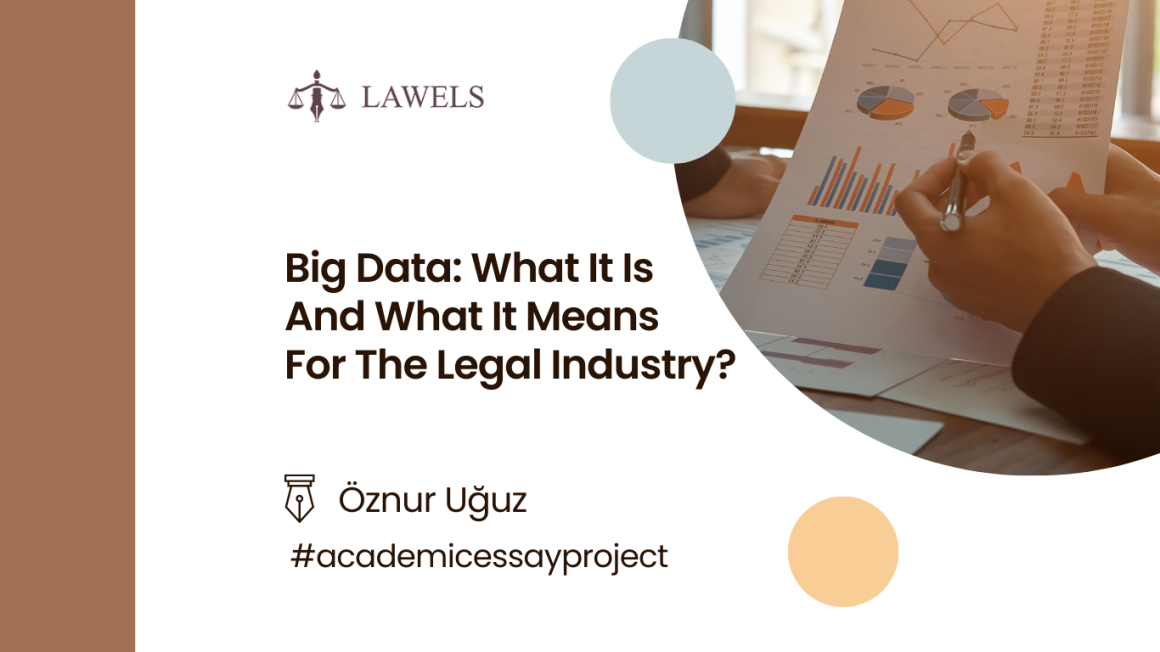Author: Öznur Uğuz, MSc in European Economy and Business Law at the Tor Vergata University of Rome, 2021-2023
Legal Editor: Bader Kabbani, LLM International Commercial and Economic Law, SOAS, University of London, 2020-2021
Abstract
In the digital age we live in, data is considered a valuable asset like gold and oil. The term “Big Data,” which has become a buzzword in technology and business in recent years, is a reflection of this data-driven digitalization. Its impact area has gone above and beyond technology and business in recent years and it is increasingly being used in more and more industries. Among them is the digitally transforming legal industry, in which large volumes of client data are handled by law firms and other legal entities. Big Data can help these legal organisations save cost and time as well as improve the accuracy and efficiency of their work. However, with Big Data comes big challenges, which are even greater for legal organisations which hold files of personal and confidential data by nature of their work. In this article, I will first explain what Big Data is and what it means for the legal industry. Secondly, I will briefly refer to its potential benefits and conclude by discussing the challenges legal professionals might face when dealing with Big Data.
What Is Big Data?
The term Big Data may be defined as gigantic amounts of complex digital data generated at high speed from various sources, whose handling is not possible with traditional technical means but requires new and more powerful technologies. Big Data is considered to have three main characteristics that are called the 3V model: volume, velocity, and variety. Volume refers to the large volumes of data from which Big Data takes its name, while velocity is about how fast the data is created, generated or produced. Variety, on the other hand, relates to the types of data. Big Data is generated from various sources and generally comes under the categories of structured, semi-structured, and unstructured data.
In addition, many consider veracity another key characteristic of Big Data, which refers to the quality and accuracy of the data and its source. Recently, new 7V and 10V Big Data models have also emerged and value, variability, and visualisation are now seen by many as the defining factors of Big Data.
How Is It Used?
Big Data, like other digital phenomena, is not an isolated concept but is closely related to many other digital technologies. It requires advanced analytical tools such as AI to generate optimum results just as those need Big Data to perform to their highest potential. Open Data phenomenon, the Internet of Things, Cloud Computing, and many other technological concepts are also closely linked to Big Data as all these systems rely on or at least work with immense amounts of data. Through these advanced technologies, Big Data can be used in both the private and public sectors to optimize and personalize services, detect risks and opportunities, and predict certain events as well as for research-related purposes. Nowadays, Big Data is already being utilised in many major industries such as finance, retail, media and entertainment, insurance, and marketing, and continue to expand its application area.
Big Data is a great resource also for the legal industry, for which data is an essential asset. However, the relationship between Big Data and the legal industry is a little more complex due to the lawyer-centric and labour-intensive nature of the industry as well as the serious legal challenges Big Data brings about along with its benefits.
Potential Benefits For The Legal Industry
Big data can benefit legal organisations in many ways in terms of productivity, efficiency, and time management. It can be utilised in both the internal and external aspects of an organisation. Internally, Big Data can help law firms with organisational matters and management of human capital such as by providing more insight into the optimal task and time allocation and facilitating legal research and document review processes. In addition, Big Data can be used for the client-facing aspects of legal work. With Big Data, legal professionals can analyze past cases to find patterns and predict outcomes of ongoing cases, which would enable them to inform clients about possible outcomes and make accurate pricing decisions. Legal organisations can further resort to Big Data for regulatory compliance in order to reduce the chances of any involuntary breaches and violations. Contract management, client support, and recruitment are the other notable aspects, in which legal professionals can benefit from Big Data.
Main Legal Challenges
Notwithstanding its benefits, the use of Big Data entails several challenges for legal professionals, particularly with regard to data protection. Legal professionals may encounter these challenges both first-hand when handling their clients’ data and in the form of legal disputes coming before them. Big Data, by nature, threatens a number of data protection principles that provide safeguards against violation of privacy and other fundamental rights.
One of these principles is the purpose limitation principle. The principle is covered by Article 5(1)(b) of the EU General Data Protection Regulation (GDPR) and states that personal data should only be processed for the specified purpose it was collected and not for other unspecified purposes. Yet, in the Big Data concept, large amounts of data are often gathered with no predetermined purpose and are later analysed and reused for different purposes. This might cause data subjects to lose control over their data and create issues with data ownership, leaving data subjects exposed and deprived of exercising their rights to their own personal data.
Another principle further challenged by big data is data minimization, mentioned in Article 5(1)(c) of the GDPR. According to the principle, the collection and processing of personal data must be limited to what is adequate and necessary to fulfil the specific purpose it was intended for. This appears to be in contradiction with the core idea of Big Data, which is to collect as much data as possible to be analysed later. Data accuracy might also be a concern in that respect as the margin of error is likely to be much higher for such immense volumes of data.
Transparency, which is addressed by Articles 12,13, and 14 of the GDPR, is another pivotal data protection principle often undermined by Big Data. That is because transparency demands clarity, traceability, and openness in terms of what data is collected by whom and for what purposes, which is often unclear in Big Data processes. This complexity and widespread nature of Big Data which contradicts the key data protection principles might lead to the violation of privacy and other fundamental rights of data subjects, who lose track of their data and give away more than they actually consent to.
Considering the extensive amounts of data legal professionals deal with, most of which are confidential client information, legal organisations should take extra care over data protection and management. Large volumes of data also mean high risks to data security. Legal organisations might be a target of cyber-attacks and must implement appropriate technical and organisational measures to mitigate such risks. That is not only a legal requirement under Article 32 of the GDPR but also a necessity to avoid any cost in terms of money and reputation, which might occur in case of a data breach.
How to Regulate The Challenges?
It is clear from the picture that Big Data has brought and will continue to bring big changes to the legal industry and the wider socio-economic ecosystem. Given its peculiar nature that challenges the data protection principles established by the existing legal framework, new regulations directly addressing Big Data and the issues stemming from it seem necessary. While traditional data protection regulations can be applied in the context of Big Data, this might deprive it of the characteristics that make it what it is in the first place. It is the unconventional characteristics of Big Data such as its immense and complex composition that give it its value-creating potential and distinguishes it from other data trends. This creates a dilemma and requires a trade-off between data protection and innovation which lawmakers need to make. When dealing with this dilemma, any potential risks should be weighed against the potential benefits that might be derived from Big Data and the protection of the data subject’s fundamental rights must be upheld.
References
Data Protection Commission, ‘Principles of Data Protection’ <https://www.dataprotection.ie/en/individuals/data-protection-basics/principles-data-protection> data accessed
Bart van der Sloot & Sascha van Schendel, ‘International and Comparative Legal Study on Big Data’ (WRR, 2016) <https://bartvandersloot.com/onewebmedia/WP_20_International_and_Comparative_Legal_Study_on_Big_Data.pdf> data accessed
Devins C, Felin T, Kauffman S, Koppl R, ‘The Law And Big Data’ <https://ww3.lawschool.cornell.edu/research/JLPP/upload/Devins-et-al-final.pdf> data accessed
Manickam Kone S, ‘Big Data, Law & Regulating Big Data’ (LAWYERED, 12 November 2020) LAWYERED <https://www.lawyered.in/legal-disrupt/articles/big-data-law-regulating-big-data-sanjay-mehta/> data accessed
Altlaw, ‘5 legal challenges of big data’ <https://www.altlaw.co.uk/blog/legal-challenges-of-big-data> data accessed
Zodi Z, ‘Law and Legal Science in the Age of Big Data’ (June 2017) <https://www.researchgate.net/publication/320643327_Law_and_Legal_Science_in_the_Age_of_Big_Data> data accessed
Wills K, ‘Privacy Law Considerations of AI and Big Data – In the U.S. & Abroad’ (21 July 2021) <https://cip2.gmu.edu/2021/07/27/privacy-law-considerations-of-ai-and-big-data-in-the-u-s-abroad/> data accessed
Mallon S, ‘When Big Data Meets Big Law – the Role of Data in Legal Services’ (6 June 2021) <https://www.smartdatacollective.com/when-big-data-meets-big-law-role-in-legal-services/> data accessed
This article is written within the Academic Essay Project (AEP) organised by LAWELS. AEP aims to increase the number of quality academic writings on legal topics, encourage young lawyers to participate in academic writing, and lay the foundation of an online database on legal science. The team of legal editors and legal writers share their knowledge through high-end essays that we are publishing on our website and social media accounts for the world to read and learn from.
The articles on the LAWELS platform are not, nor are they intended to be legal advice. You should consult a lawyer for individual advice or assessment regarding your own situation. The article only reflects the views of the author.


